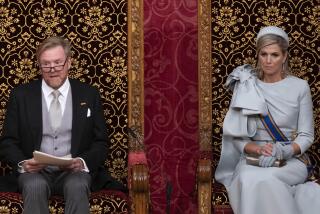Mandela Warns Criminals, Urges Cooperation in Building S. Africa
CAPE TOWN, South Africa — Criminals and extremists were warned that police were determined to quash violence. Investors were reassured that reforms were coming. And lawmakers roared at his jokes.
The president’s fourth state-of-the-nation address Friday was vintage Nelson Mandela.
Mandela, 78, was at once tough and personable, threatening and conciliatory in launching the first Parliament session under South Africa’s new constitution.
The president--who wants to be the man who reconciles a society deeply divided by decades of apartheid’s racial repression--told extremists not to test South Africa’s long-oppressed black majority with acts of violence.
“It will be the height of folly for anyone to seek to provoke the patience of a people who have elected, against their own deep emotions, to forgive and reconcile. For their retribution will be decisive and telling,” Mandela warned.
Some had hoped Mandela would use the occasion to announce sweeping new programs for social change or bold new economic steps, such as lifting currency exchange controls.
But the president remained on the current course, calling for tight spending policies and saying only that the government was committed to removing exchange controls in phases.
The controls, left over from apartheid days, are considered a hindrance to foreign investment. But the government fears lifting them now would start a flow of capital out of the country.
Opposition leaders also complained the speech contained few new ideas and downplayed some problems, including crime.
The leader of the white-led National Party, Mandela’s predecessor, F.W. de Klerk, said afterward that Mandela “whitewashed” the failures of his government and presented a false picture of South Africa.
Mandela listed his government’s accomplishments--programs that helped feed more than 1 million of the poorest people, supplied more people with water and electricity, built new clinics and homes.
He also said South Africa’s economy was performing well with 3% growth last year. Still, Mandela conceded the growth was not enough to slash high unemployment and said corruption continued to siphon off millions of dollars.
Mandela said the new constitution, which took effect Feb. 1., laid the foundation for a peaceful and prosperous nation.
The charter guarantees rights to adequate housing, food, water, education and health care--all of which were mostly denied the black majority in the apartheid era. It also bans discrimination on the basis of race, gender, sexual orientation, age, pregnancy or marital status.
“Our task is to mobilize all our people, to create more and more opportunities to ensure that the citizen’s potential is give the fullest expression,” Mandela said.
More to Read
Sign up for Essential California
The most important California stories and recommendations in your inbox every morning.
You may occasionally receive promotional content from the Los Angeles Times.










